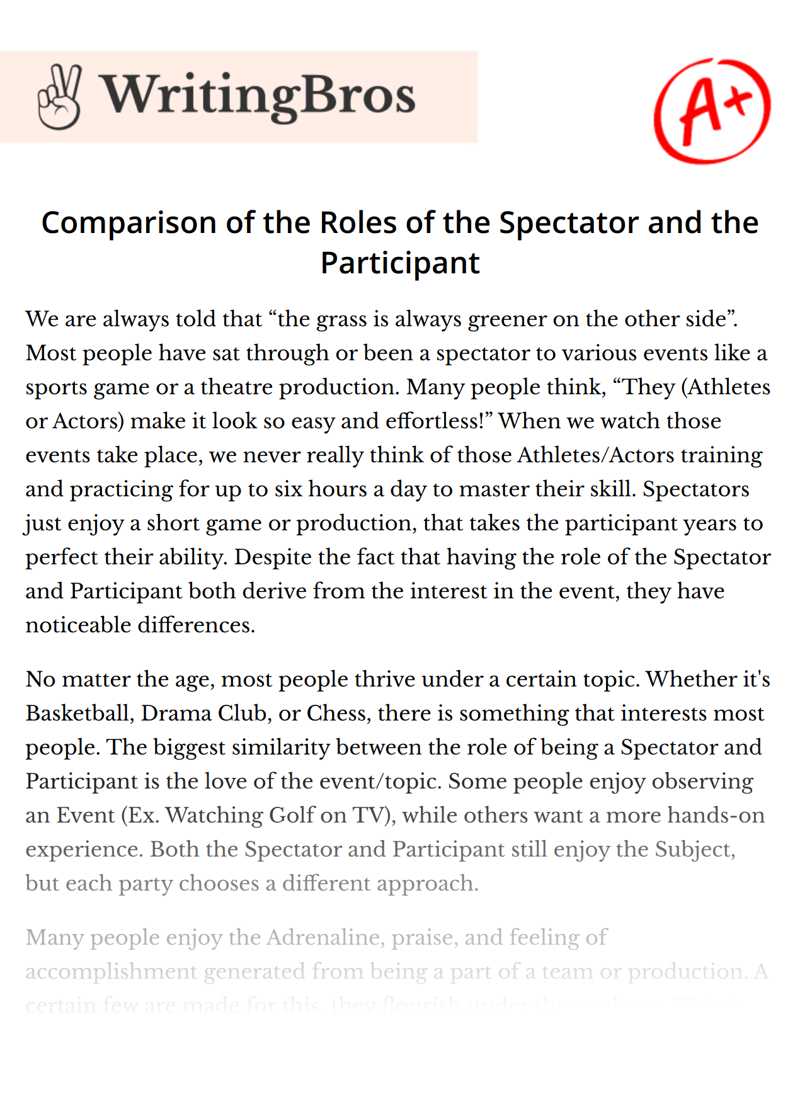Comparison of the Roles of the Spectator and the Participant

We are always told that “the grass is always greener on the other side”. Most people have sat through or been a spectator to various events like a sports game or a theatre production. Many people think, “They (Athletes or Actors) make it look so easy and effortless!” When we watch those events take place, we never really think of those Athletes/Actors training and practicing for up to six hours a day to master their skill. Spectators just enjoy a short game or production, that takes the participant years to perfect their ability. Despite the fact that having the role of the Spectator and Participant both derive from the interest in the event, they have noticeable differences.
No matter the age, most people thrive under a certain topic. Whether it's Basketball, Drama Club, or Chess, there is something that interests most people. The biggest similarity between the role of being a Spectator and Participant is the love of the event/topic. Some people enjoy observing an Event (Ex. Watching Golf on TV), while others want a more hands-on experience. Both the Spectator and Participant still enjoy the Subject, but each party chooses a different approach.
Many people enjoy the Adrenaline, praise, and feeling of accomplishment generated from being a part of a team or production. A certain few are made for this, they flourish under the applause. This is one of the reasons many choose to become the Participant. Some feel that they would much rather make their mark on the field or stage rather than in the stands. While many lack the confidence of thinking they have what it takes, or they are good enough to try to attempt their passion.
While a certain few know every aspect of an activity, such as a die-hard fan who lives and breathes football. Many people understand the simple regulations and rules of an activity, but most couldn't care less to be know-it-alls. One of the differences between a Spectator and the Participant is that when you are actually taking part in an activity you need to know almost every aspect. Of course, the Spectator can get by if they accidentally misinterpret or misunderstand information about the event, but for Participants, it's another story. Participants learn to be masters of their craft, executing every play or scene with perfection. Participants practice and memorize the vital details of their subject.
No one wants to ruin their reputation. Many people hate taking risks because the chance of failing is usually bigger than succeeding. According to Lisa Wood, “When you’re a participant, it’s much harder to hide in the crowd. You don’t blend in, and you don’t want to. You don’t hide your ideas and opinions, you share them and act on them. When you’re a participant, you ignore the fear and take the risk – knowing that you might fail.” When Spectators realize the possible risks, many do not choose to take the chance. That's where the line is drawn between the Spectator and the Participant.
Spectators choose to fly under the radar. As Lisa Wood states, “As a spectator, it’s easy to blend, to hide, to go with the flow and It’s safe. And safe is good…right?”
You're safe and secure. There is no chance for you to make mistakes or have faults because you've chosen to have no one listen to you. Picture sitting on the bench, the bench is all the great ideas and possible suggestions. You choose to pass on the chance, and your great ideas will start to decline and languish. On the other hand, Participants seize the opportunity and act on it in full force.
The Participant and the Spectator are two very different sets of people. Spectators are fine watching from the sidelines, while participants have to be in on the action. There is no correct side between the two because they each love their subject. Without one of them, how could something like “Football or Broadway” ever exist?
Cite this Essay
To export a reference to this article please select a referencing style below

